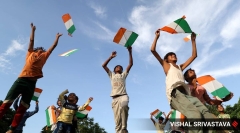I see India at 100, confident, joyous and secure in its composite cultural identity. Aware that diversity is to be prized, not policed. Aware that plurality is to be embraced, rather than erased. Aware that Indianness is an inheritance that is falsified as soon as it is rigidly defined.
A dream? Perhaps. But I am poet enough to believe in the alchemical power of dreams.
When I think of this Subcontinent’s greatest dreamers, I think of the mystic poets — those who wore their cultural skins with affectionate irreverence and jubilant freedom. That mix can be inspirational to a country seeking a middle path between cultural apathy and cultural dogmatism. There is another way to inhabit ourselves, these poets remind us, between abjectness and arrogance; between colonial cringe and revivalist rhetoric; between cultural devaluation and cultural deep-freeze; between grovelling and chest-thumping.
A way to celebrate our roots without turning parochial. A way to become world citizens without compromising our cultural signature. A way to become conduits rather than territorial custodians, collaborators rather than passive inheritors. Instead of waving flags, these poets tell us there is another way to reclaim our spine.
At the close of the Mahabharata, Yudhishthira finds every moral certainty shattered. Vyasa offers us a vision of a many-sided truth — one that lies beyond polarities of dark and light, virtue and vice. A faithful dog offers a flickering insight that an unreasonable love might be the only way to navigate a world ravaged by binaries. This is not mere ethical relativism; it is an ability to see the power of the “and”, rather than “either” and “or”. It is a reminder that “only the complicated, ambiguous victories are worth having”, in contemporary poet Vijay Seshadri’s words. The originality of this insight could well be one of India’s greatest gifts to the world.
Consider, too, the Bhakti poets. There are many reasons to celebrate these free-spirited seekers. For one, they are proud upstarts, not card-carrying gatekeepers; their spirituality is based on achievement, not ascription. They hail from varied caste, class, gender, language and sectarian backgrounds, reminding us of the plural aspects of our spiritual genealogy.
Moreover, they remind us of the power of the reclaimed heart and the examined life. They journey into every inconvenient crevice in their psyches, aware that all darkness can be transformed by the act of acknowledgement and inclusion. This makes them inspirational for any culture seeking to heal its wounds and move forward, without getting mired in rage or recrimination.
Thirdly, their finest poems do not present easy hierarchies between flesh and spirit. While Basavanna declares that the body is “the moving temple”, Chandidas proclaims that “man is the greatest truth of all”. The women dreamers are equally outspoken. Janabai asserts, “I eat god, I drink god, I sleep on god”, while Soyarabai affirms that the divine is not bloodless: “If menstrual blood makes me impure/ tell me who was not born of that blood”. Collectively, they offer us a less divided gaze, reminding us that we are dual citizens of earth and sky, body and mind, the immanent and the transcendent. The path to wholeness is not in amputation but in integration.
Above all, these poets remind us that dissent is never disloyalty. They are not meek worshipers; they are radical improvisers who question every hierarchy. The ninda stuti, a tantrum in verse, is a wonderful poetic genre where the seeker has the licence to argue freely with god. Janabai speaks of a god who does the dishes and washes her hair. “He’s the master,” says the poet, Annamacharya, but adds with irrefutable logic: “He’s my slave.” God here is not boss; he’s a birthright.
The Bhakti poets quarrel with their gods, swear at them, make love to them, and dispense with them. Nothing is taboo, nothing sacrilegious, because the underlying premise is simple: The self and the other cannot be kept apart. Here is a matchless legacy of spiritual freedom and egalitarianism.
And yet, the bhaktas’ rage stems from love, not ridicule. Even while they disagree with their gods, they never stop loving them. In a world where we are prone to despise those with whom we disagree, these poets offer us a vision unstained by derision. Intimacy is the basis of their vision. For them, critique is never contempt — yet another vital contribution to a planet besieged by a creaky paradigm of “us” versus “them”. For the bhakti poet, there is no “versus”, because there is no “them”. There is no outsider, no adversary, because there is, indeed, no “other”. God is simply treated as a disobedient member of one’s own family!
Ours is a living civilisational legacy, not a fossilised one. Our ecstatic and contemplative spiritual traditions are alive and well; our holistic healing systems and our traditional arts remain vibrant; our capacity to honour the divine feminine endures; and our linguistic and cultural diversity lives not in museums but on streets, in homes, in hearts. Much is already in place. What remains is the need to stop flattening our indefinable unity into an unimaginative uniformity; to stop turning difference into discrimination.
I envision India at 100 as not merely a politically-independent nation, but one that has outgrown the adolescent trauma of shame, guilt and finger-pointing. That offers the world its radiant template of spiritual freedom and cultural democracy. That holds colliding perspectives in harmony. That refuses to demonise an imagined “other”, knowing that intimacy is the basis of human life — more than ever in the new global village.
It would be a tragedy to reduce the grandeur of this vision to slogans and bumper stickers. It is time to embody it.
The writer is a poet and author. This article is part of an ongoing series, which began on August 15, by women who have made a mark, across sectors.

